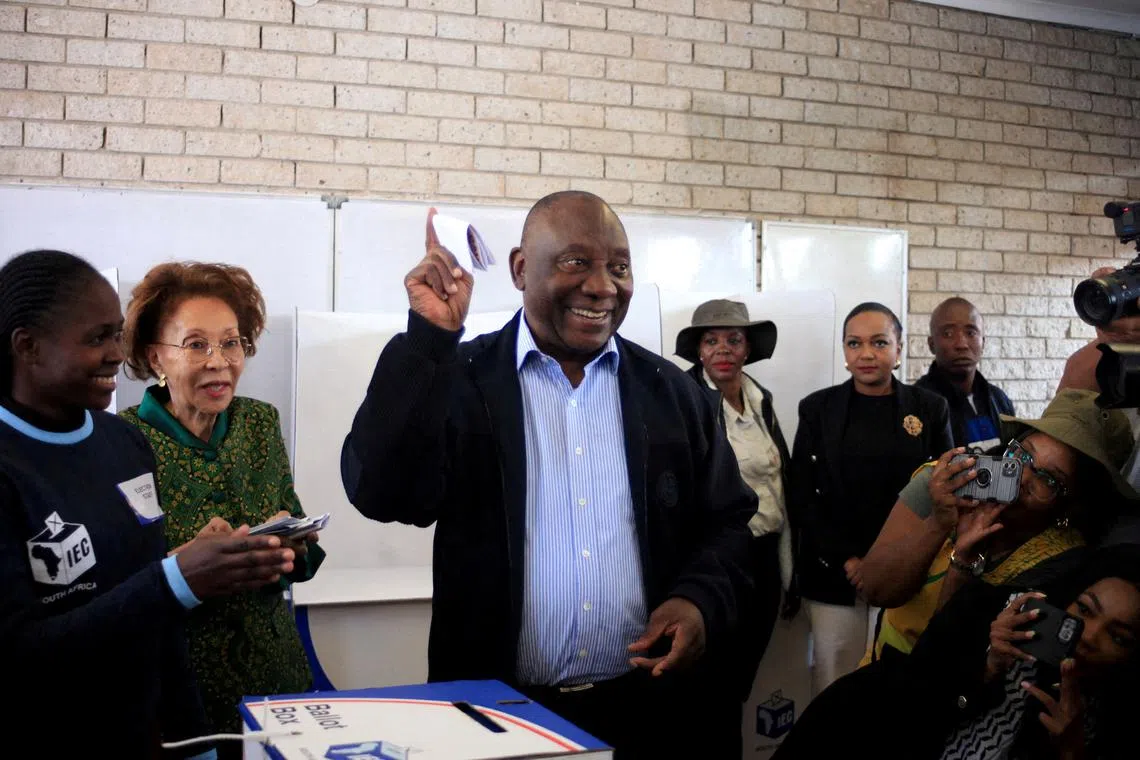South Africa’s Ramaphosa survives ANC hammering to win second term
Sign up now: Get ST's newsletters delivered to your inbox

Mr Cyril Ramaphosa was re-elected as South Africa's president on June 14.
PHOTO: REUTERS
JOHANNESBURG – Mr Cyril Ramaphosa was re-elected as South Africa’s president on June 14, having brokered a deal with the opposition for a government of national unity after his African National Congress (ANC) party’s worst election result since the end of apartheid.
A skilful negotiator, Mr Ramaphosa clinched the agreement with the white-led Democratic Alliance (DA) and at least two other smaller parties as the National Assembly held its first sitting since the election and prepared to elect a head of state.
But Mr Ramaphosa, 71, has emerged weakened from the May 29 election as the ANC lost its parliamentary majority, and some political analysts have questioned whether he will be able to serve a full second five-year term.
The ANC won just 40 per cent of the vote, meaning Mr Nelson Mandela’s legacy liberation movement had to negotiate a power-sharing agreement with rival parties for the first time in 30 years.
Besides the DA, the ANC’s partners in the coalition government include the socially conservative Inkatha Freedom Party (IFP) and the right-wing Patriotic Alliance (PA).
Many questions remain about how they will divide key jobs and reconcile opposing policy positions.
An ANC member was elected Parliament Speaker, while a DA candidate was made deputy Speaker. Mr Ramaphosa is expected to have to cede Cabinet positions to the DA, IFP and PA.
After the vote, former union leader-turned-businessman Ramaphosa – who was Mr Mandela’s lead negotiator in talks to end apartheid – received the backing of top ANC officials to stay on.
But his party is deeply divided, and some of his party rivals may not have buried the hatchet for long.
Tough test
Mr Ramaphosa’s future as president had hung in the balance before. A panel report found in 2022 that he may have committed misconduct over a stash of cash stuffed into furniture at his game farm.
He denied wrongdoing over that scandal, dubbed Farmgate, and won a new five-year term as ANC leader later that year.
But the May election, in which the ANC’s vote share slumped because of voter anger over issues such as high unemployment, crime and crippling power cuts, could pose an even bigger challenge.
Mr Ramaphosa was elected ANC leader in late 2017 on a pledge to clean up the party’s image and revitalise the economy after nine years of scandal, sleaze and economic decline under his predecessor, Mr Jacob Zuma.
But an initial wave of euphoria when he became head of state in 2018 quickly faded.
More than six years on, the economy remains stagnant and scandals still swirl around top ANC officials.
The decisive blow in the May election was struck by Mr Ramaphosa’s nemesis, Mr Zuma, whose new party uMkhonto we Sizwe outperformed expectations and made a big dent in ANC support, especially in Mr Zuma’s home province of KwaZulu-Natal.
Indecisive or consensus builder?
Mr Ramaphosa has been criticised for appearing to prevaricate on crucial reforms to avoid exacerbating rifts in his party – a far cry from the decisiveness he showed as a union leader in the 1980s.
His supporters, however, applaud his consensus-building skills and his role in advancing South Africa’s reputation as a champion of the so-called Global South, a term that refers to a group of low- and middle-income countries.
During the Covid-19 pandemic, Mr Ramaphosa was one of the most prominent voices globally calling for fairer distribution of vaccines.
More recently, South Africa filed a genocide case against Israel at the International Court of Justice, leading judges to rule in May that Israel must halt its military assault on the Gaza city of Rafah. Israel has rejected the allegations and pressed on with its offensive in Rafah.
On the campaign trail, Mr Ramaphosa sought to play up the ANC’s successes over the last 30 years, but critics say he has offered little in the way of new solutions to South Africa’s biggest challenges.
After the vote, he urged parties to bridge their ideological and racial divisions for the good of the country.
“South Africans expect the parties for which they have voted to find common ground, overcome their differences and act together for the good of everyone. That’s what South Africans have said,” he declared. REUTERS


